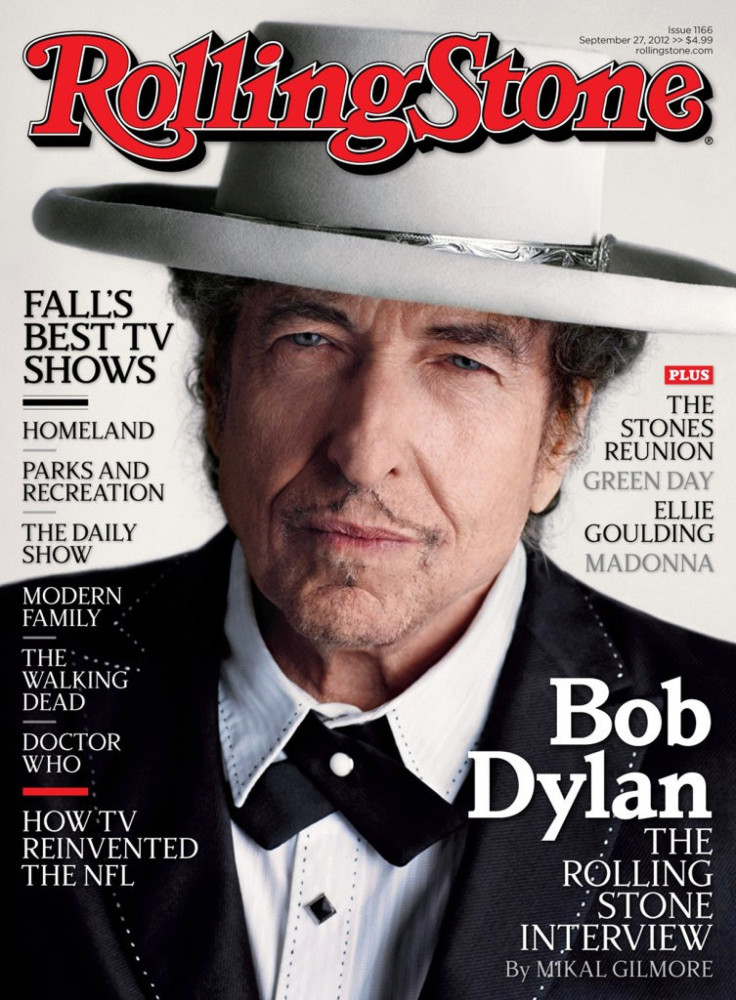Bob Dylan Is Insane Or Senile (Or Both)

Bob Dylan ranks as one of the greatest artists in rock-and-roll history – there is no argument over this assertion.
Original, eccentric, provocative, unpredictable and incredibly prolific, Dylan's records will last forever and continue to inspire millions with their creativity and astonishing poetic imagery long after he has departed this earthly realm.
“Bringing It Back All Back Home,” “The Freewheelin' Bob Dylan, “Blonde on Blonde,” among other albums, represent the very pinnacle of late 20th century American music,
His contributions to culture are magnificent and immortal.
However, Dylan's glory years are long since gone -- at the age of 71 he has apparently sunk into a cesspool of senility, self-pity and pointless anger.
If there were any doubts about his fragile mental state, his recent interview with Rolling Stone should put them all to rest.
Ahead of the release of his 35th career album, “Tempest,” Dylan has delivered one of the most bizarre, rambling, meandering and downright crazy interviews I have ever read.
I will concede that Dylan is now quite elderly and he has long suffered from drug-and-alcohol addictions -– plus living constantly on tour, facing an endless series of hotels and airports, likely corrodes one's faculties and sense of perspective. But the magnitude of his delusions and scatterbrained comments is so great that I must conclude that he is mentally ill.
The Rolling Stone interview –- conducted by the author Mikal Gilmore – appears to have been spliced together through face-to-face sit-downs, phone conversations and e-mail correspondence (assuming Dylan even knows how to use the Internet). I can only assume that Gilmore and Dylan exchanged more dialogue than what has been printed on those pages -- but if this is the edited, concise version of their chat, then Bob has really gone off the deep end.
Overall, Dylan comes across as incoherent, hostile, self-pitying and, well, not too bright. The interviewer accords him the utmost respect and repeatedly praises his works and talent – but Dylan seems dismissive of such compliments and then veers off on wild tangents.
I must admit, I have always been puzzled and perplexed by the sheer breadth of Dylan's fame.
Although I love his earlier work (namely, everything from his 1962 debut album 'Bob Dylan' up to 'Slow Train Running' in 1979), I recognize that he is definitely an acquired taste. He should have been a 'niche player' rather than a dominant figure in pop-rock since he was never commercial, did not sell a ton of records, and refused to ever abide by the whims of the capricious marketplace.
Dylan was the darling of the critics and hard-core fans –- he never really appealed to the vast broad record-buying public, like Elvis Presley and The Beatles.
Somehow, through the efforts and advocacy of enthusiastic intellectual critics, Dylan's reputation solidified him as a rock-and-roll giant.
Dylan is indeed a most unlikely rock legend -- with his nasal, wheezy voice, his homely visage and the grim subject matter of his songs, he violates every principle of commercial pop music success. Ask yourself: Does he have Elvis' extraordinary handsome looks? Does he have Otis Redding's electrifying stage presence? Can he compose beautiful, unforgettable melodies like Paul McCartney? Does he possess David Bowie's sex appeal?
No, no, no and no.
Perhaps Dylan is embittered by the fact that he was never as commercially successful as many of his 1960s peers; or maybe he's simply happy to play for his niche audience, while concurrently (paradoxically?) enjoying the acclaim of the broader public.
In any case, in the twilight of his life, Dylan seems very unsettled and frustrated.
The Rolling Stone interview is extremely tedious and goes around in circles – at certain points, Dylan is quite lucid and concrete; but for the most part, he rambles or spews vague generalities or refuses to answer the questions posed to him.
Perhaps the most stunning departure from reality occurs when he claims that the soul of a Hell's Angel motorcycle thug named Bobby Zimmerman (Dylan's actual appellation) “trans-migrated” to him after he (the Angel) was killed in a traffic accident.
Dylan goes on and on about this -– and the interviewer indulges him in this insane flight of fancy.
In another segment, when he is questioned about allegations of plagiarism in his songs, Dylan goes on a wild paranoid spiel about how he has been unfairly targeted and vilified by such accusations (although he never actually denies the charge).
I am certain that Rolling Stone wanted to venerate Bob Dylan and champion him as a brilliant songwriter and poetic visionary –- but, quite frankly, they have depicted him (perhaps accurately) as a befuddled old gent who has completely lost his marbles.
© Copyright IBTimes 2025. All rights reserved.





















